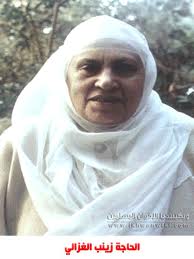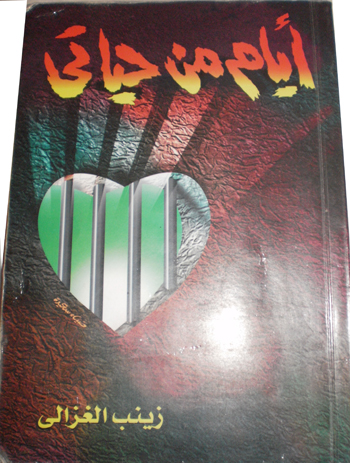 Ahmad Fuad Rahmat | Research Fellow, Islamic Renaissance Front (IRF)
Ahmad Fuad Rahmat | Research Fellow, Islamic Renaissance Front (IRF)
There was, for one, a strong sufistic and spiritual element to her feminism. This sufistic element is particularly unique to the Egyptian context in that it was hagio-centric, based on the teachings or example of a usually male mystical leader. In the case of Zainab Al-Ghazali, the leader who she had turned to most for inspiration was Hasan Al-Banna founder of the Muslim Brotherhood [al-Ikhwan al-Muslimun]. She had even said once that “I have sworn an oath of fealty to Hasan al-Banna that I shall die in God’s path…” [1]
Zainab al-Ghazali and the Muslim Brotherhood
 This, at any rate, is relevant because the inspiration in having an activist spiritual leader meant that, for Al-Ghazali, Islam was not simply a source of spiritual fulfillment, but also practical political resilience. More fascinatingly, in her prison memoirs, “Ayyam min Hayati” loosely translated as “Return of the Pharoah” in English, Al-Ghazali wrote of dreams whereby she had communicated with the Prophet Muhammad (PBUH) himself and later on Sayyid Qutb on the night of his execution by the Egyptian authorities.
This, at any rate, is relevant because the inspiration in having an activist spiritual leader meant that, for Al-Ghazali, Islam was not simply a source of spiritual fulfillment, but also practical political resilience. More fascinatingly, in her prison memoirs, “Ayyam min Hayati” loosely translated as “Return of the Pharoah” in English, Al-Ghazali wrote of dreams whereby she had communicated with the Prophet Muhammad (PBUH) himself and later on Sayyid Qutb on the night of his execution by the Egyptian authorities.
Indeed, her writings show how the spiritual essence of Islam inspired her to stay steadfast and strong at the face of physical abuse when the prison dogs were unleashed to her: “The dogs were unrelenting, digging their teeth into my scalp, my shoulders, back, chest…I repeatedly invoked my Lord…’Oh Lord! Bestow on me Your Tranquility’…I expected that my clothes would be thoroughly stained with blood…But, incredulously, there was not a single blood-stain on my clothes…My God be exalted!” [2] In this we see how, for Al-Ghazali, spirituality and activism were inseparable from one another.
So what was her vision of political progress for women? Al-Ghazali was clear in her claims that women are human beings of equal value and dignity as men. Additionally, they also constitute the key agents of society. In this both religious, worldly and scientific education has a key role to play: Muslim women must be educated on the foundational subjects of Islam (the Qur’an and Sunnah) as well as politics, geography, and current events.”[3]
We must be careful to note however, however, that this call does not rest on the assumption that Egyptian Muslim women are meek and oppressed. Rather, education is called because women are always already in a position of responsibility and strength in Muslim society. Thus, education serves to better enable women to further strengthen their place in society, not necessarily to “awaken” or “enlighten” them from the dark.
Role of Women in Da’wah
This is why Al-Ghazali also saw a crucial role that women can play in da’wah. Da’wah here is to have a broader meaning than “mission”, and much less “conversion”. For Al-Ghazali, it is ultimately a form of Muslim activism, whereby women can play active roles in the overall development of Egyptian society and its resistance to imperialism and colonial culture: “It may take generations for Islam to rule. We are not rushing ahead of ourselves. On the day that Islam rules, Muslim women will find themselves in their natural kingdom, educating men.”[4]
Interestingly, this enthusiasm in the potential of women, while progressive in its content, is also marked with clear conservative tendencies. For Al-Ghazali, the first duty of the Muslim woman was motherhood. [5] Muslim women are not forbidden to participate in public life, but this must be done as part of her obligations towards children and the family. The traditional social structure is needed as part of her larger vision of the Egyptian Muslim’s struggle against imperialism.
Thus, motherhood and the need of women to successfully play their roles to maintain stable families were not, in Al-Ghazali’s view, indications of their inferiority but simply the different roles they have in society in the larger collective goal of Egypt’s progress as it would be inspired by Islam.
Given this it is not surprising that Al-Ghazali became the antithesis to modern strands of Egyptian feminism with its open affinity and admiration to European culture and society. The secularism and capitalism therein is inherently incompatible with Islam, which to her, already safeguards and provides all the necessary values needed for Muslim women to progress in society.
She did not regard the family obligations required by as compatible with the view of the woman as a free individual. For Al-Ghazali, the right for women to work was just another way for capitalism to exploit the workforce. Sexual freedom, which she saw firsthand when she was transferred to a women’s prison, was seen as an outcome of the lack of Islamic values.
Those women were “slaves to whims and desires. Their crimes had submerged them entirely and they had forgotten their humanity, purity, honor [sic] and dignity.” [6] Western feminism then was nothing more than “the imagining of issues invented by the enemies of Islam in order to attract the Muslim people’s attention away from the large issue of returning Islam to its former pride and glory…”[7]
What remains fascinating about the story of Zainab Al-Ghazali was her capacity for original thought and insights amid difficult times. She did not fall into the blind and uncritical trappings of the narrow view of women proclaimed by traditionalists. But she was equally not tempted by the perceived glitter of Western life and society that had so captivated many prominent Egyptian feminists of her generation.
Role of Women in Constructing an Islamic Society
This, as was cautioned in the introduction is no sign of meekness or moderation. Al-Ghazali may have argued for particular roles that women are most suited to play in the larger project of constructing an Islamic society, but she did not see those roles as submissive. Rather, those roles were in fact socially empowering and indispensable if viewed with the right attitude based on Islam.
Men will need women for any society to function thus women in actuality are always already with a lot to bargain with to suit their terms. The family is a mechanism for social change if women are viewed as bearers of equal rights and dignity rather than servants for men.
But more importantly, Al-Ghazali’s relevance may lie in the fact that the contest between secular and religious notions of womanhood is determined by worldviews and values. We cannot say what we want, if we are not sure of what it is that we can and can’t do. The challenge, at any rate, is not freedom but in knowing its limits. Ethics is what separates liberation from debauchery. It is easy to want to be free, but that is meaningless if we cannot first answer the question of how we are to live.
Zainab Al-Ghazali’s answers may not be able to offer us much in addressing the complex changes that had taken place in the Muslim world between her time and ours, but her amazing intellectual, political and spiritual resolve should remind us of the importance of that question.
1.Lewis, P. Zainab Al-Ghazali: Pioneer of Islamist Feminism: 20
[2] Lewis. P. Zainab Al-Ghazali: Pioneer of Islamist Feminism. 22
[3] Lewis. P. Zainab Al-Ghazali: Pioneer of Islamist Feminism. 22
[4] Ibid.
[5] Ibid.
[6] Lewis. P. Zainab Al-Ghazali: Pioneer of Islamist Feminism. 27.
[7] Lewis. P. Zainab Al-Ghazali: Pioneer of Islamist Feminism. 22.
